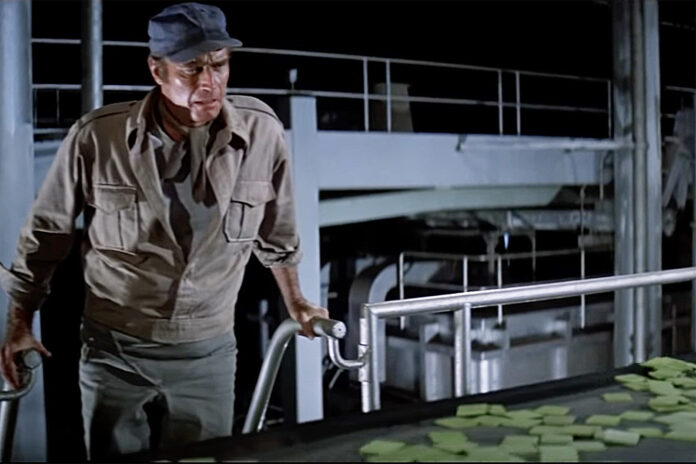Some movies acquire a kind of pop-culture folkloric immortality without ever needing to be particularly popular. Such was the case for Soylent Green, a moderate success for MGM at its corporate nadir in 1973, though nowhere near the year’s top grossers. Turning half a century old this year, it’s getting a special anniversary screening as part of the Green Film Festival, SF Indiefest’s environmental showcase, which commences in its more-or-less 3rd year programming this Thurs/12. (You may remember prior, similarly themed/named area fests, but those events are defunct.)
What everybody knows about the dystopian sci-fi thriller is its “terrible secret”—that the titular processed food citizens come to rely on in this resource-starved future turns out to be made of… well, something very disturbing, a disclosure Charlton Heston famously shouts with his dying hammy breath. But you wouldn’t have known that from Harry Harrison’s 1966 source novel Make Room! Make Room!, which didn’t even have a terrible culinary secret—its “soylent,” the food staple of the future, was simply soybeans plus lentils, nothing grisly.
MGM didn’t allow that author any input into Stanley R. Greenberg’s screenplay, however, and he said he was “50 percent” satisfied with the results, which is fair enough. Still, Soylent Green has actually aged pretty well, with director Richard Fleischer—a highly variable journeyman whose projects would soon go downhill—delivering a fairly tight package well within his action-suspense comfort zone. (Among subjects he proved less ideal for were the musical Doctor Doolittle, Omar Sharif as Che!, and Neil Diamond’s Jazz Singer remake.)
It’s 2022. Due to the “Greenhouse Effect” and overpopulation, societal inequalities have only grown more extreme. NYC’s population is 40 million (four times the actual current figure), most of which is homeless and jobless, dependent on shrinking government handouts for sustenance. A step above the rioting masses are people like Heston’s cop Thorn, who benefits from widespread corruption. But that only means he isn’t starving, and gets to swelter in a decrepit flat shared with genial ex-professor Sol (Edward G. Robinson, in his last role), who’s old enough to remember when life wasn’t this miserable.
At the top of the heap are those wealthy citizens living in high-security apartment complexes, their perks including attractive young mistresses who actually come with the lease (and are thus called “furniture”). When one such bigwig (Joseph Cotten) gets killed by an apparent burglar, Heston quickly realizes it was actually an assassination. He continues to investigate even after his superiors instruct him not to, curious just what the man knew that required being rubbed out. Variously helping or hindering are figures including Leigh Taylor-Young as Cotten’s erstwhile “furniture,” and Chuck Conners as his traitorous bodyguard.
Soylent Green is very Seventies in conspicuous ways, from its dated score and decor to the poor guessing at how technology might evolve in half a century. (In the macho universe Heston just naturally inhabits, it would also appear that feminism was just a passing Me Decade fad, as women now appear completely powerless.) It’s pretty obvious that this crowded hothouse Manhattan is just old MGM backlot sets dirtied up more than usual. Yet if the movie’s “futuristic” 2022 bears no great resemblance to our present (or recent past), it does present a viable picture of the real-world future, with skyrocketing temperatures, withering crops, and a wealthy elite controlling nations no longer even pretending to be democracies. Corporations rule, and the poor are their most disposable commodity.
Harrison may have been displeased, but Greenberg’s is a pretty strong script, offering plot propulsion and sobering “message” in equal measure. It also arrived as a grace note for Robinson, who died before the film was released. He gets to die onscreen in a sequence that is dignified and thoughtful—a form of euthanasia that affords its volunteer subject one last glimpse of the Earthly paradise (re: pristine wildlife panoramas) mankind had destroyed out of genuine, then willful ignorance. Given what we’re up against now with climate change, not to mention the rise of billionaire-friendly fascist movements, Soylent Green’s sci-fi melodrama remains more prescient than one might have expected 50 years ago.
It plays the Roxie Sat/14 at 8:45pm. The night before, the Green Fest’s in-person screenings begin there with another narrative feature, Aaron Khandros’ Stay at Conder Beach, centering on mysterious deaths in a Gulf Coast town fringed by oil rigs. (On-demand selections can be accessed anytime between Thurs/12-Sun/22.) But a majority of the festival’s fare is in the realm of documentary, including the official closer on Thurs/19 of Maren Poitras’ economic analysis Finding the Money.
Other nonfiction highlights throw a spotlight on animal rights and lives (Call Me Mule), indigenous cultures (The Island In Me, Between the Rains), migrant labor (A Thousand Pines), vanishing natural resources (Down River Jordan) and human habitats (Lagunaria), progressive ranching (We Are Tenacious), national parks (Out There), and much more. The disparate 50-plus films on tap also encompass shorts programs, local subjects. For full info, go here.

Once again, the Green Film Festival will be running in tandem with another Indiefest offshoot, SF Short Film Festival, sharing the same dates at the Roxie and online. The over 100 titles have been gathered from all over the world, their narrative and non-fiction choices including comedy, horror, LGBTQ themes, animation, performing-arts and sports showcases, sci-fi, romance,et al. There are few things more surprising or satisfying than taking your chances on a miscellany of shorts programmed together by loose theme—or by your own streaming whims. Its full program is available to survey here.
The Green-Shorts combo is hardly the sole special cinematic event happening in the Bay Area this week. The Albany Film Festival is also commencing its 13th edition on Thu/12 with a thematially overlapping quartet of “GreenDocs” scrutinizing environmental issues. Sat/14 and Sun/15 bring additional programs of narrative and non-fiction shorts; all programs are at the Rialto Cinemas Cerrito in El Cerrito, more info here.
Also on Thu/12, SF Cinematheque and the CounterPulse Festival co-present “Hail Lucifer! Remembering Kenneth Anger,” a tribute to the transgressive gay experimentalist, occult dabbler and sometime San Francisco resident who died five months ago at age 96. It will include works from notorious homoerotic trailblazers Fireworks (1947) and Scorpio Rising(1963) to the 1969 counterculture deviltry Invocation of My Demon Brother, which involved participation from the Rolling Stones, Anton LaVey, and Manson Family member Bobby Beausoleil. More info here.
Quite possibly of related interest is Other Cinema’s “Underground Art-Stars” program on Sat/14 at ATA in the Mission. Visiting filmmaker/curator Marie Losier, in town for a Residents shoot, will show some of her screen portraits of avant-garde artistes, including Genesis P-Orridge, Felix Kubin, and the Brothers Kuchar. Mike Kuchar will actually be present, the late George sadly not (save onscreen). More info here.
Considerably more tethered to conventional reality are three new dramatic features variably based on historical truth. Each has bypassed Bay Area theaters, but all are available on streaming platforms as of Tues/10.
The best of them, and also the one set in the most recent past, is David Wagner’s Eismayer. Gerhard Liebmann plays the titular figure, a notoriously tough drill sergeant in the Austrian Armed Forces. His stern tactics don’t seem to ruffle new recruit Falak (Luka Dimic), whose bemused confidence unsettles his trainer—as does his “openly gay” status. All the more so because Eismayer, though married and a father, is also a closet case. Well crafted and acted, this sturdy dramatization (whose real-life protagonists are, we’re informed, still together and still in the military) suffers only from limited psychological insight in its arguably too-brisk script. Dark Star Pictures releases it to U.S. DVD and digital on Oct. 10.
Retelling another ultimately inspirational tale with a somewhat heavier hand is Miranda’s Victim, which Vertical Entertainment released to On Demand platforms (and theaters, but none local) last Fri/6. Abigail Breslin plays a Phoenix high schooler who in 1963 was abducted and raped by a stranger while walking home from her job at a movie house. Her assailant (Sebastian Quinn as Ernesto Miranda) was duly convicted. But that got overturned on technicalities in a court case that became famous for instituting that criminal suspects must be appraised of their legal rights, including the right to remain silent, by police or other officials. It was a positive change for the justice system in general, albeit at the cost of re-traumatizing at least one crime victim.
This story can hardly help but have moments of considerable power, particularly while underlining the systemic insensitivity towards sexual assault victims that was typical at the time. But Danner’s professionally mediocre direction and J. Craig Stiles’ on-the-nose screenplay sacrifice nuance for a blunt approach that makes caricatures of the heroine’s unsympathetic mother (Mireille Enos), her boorish eventual husband (Josh Bowman), and the sneering ACLU lawyer (Ryan Philippe) who throws her under the bus to secure a future of “Miranda rights.” (Other significant figures are played by Luke Wilson, Andy Garcia, Kyle McLachlan, Taryn Manning, and Donald Sutherland.) It’s an important subject, though I wish Miranda’s Victim didn’t play quite so much like a hand-wringing Lifetime movie.
Likewise easier to laud for intentions than results is Freedom’s Path from writer-director Brett Smith. Its historical fiction finds naive young Union Army conscript William (Gerran Howell) barely surviving his first battle during the Civil War. Wounded, he’s found by some runaway slaves, but they are soon set upon by a vicious bounty-hunting gang. Only William and Kitch (RJ Cyler) survive, the latter turning out to be an operative of the Underground Railroad, one of whose hideouts the young men retreat to.
William isn’t so much bigoted as ignorant—he has no real racial malice, just lack of experience with anyone unlike himself. Much of Path is taken up with the slowly evolving friendship between these two boys who are still just whelps, despite one being born into a much more brutally disillusioning life than the other. This ambitious indie production is handsomely shot and well-cast, but for its length (131 minutes), there’s not a lot of complexity here.
From the villain’s literal “redneck” (he’s ginger-bearded) to the strained efforts at Terrence Malick-style lyricism, the film is earnest but sentimentally simplistic, as well as a bit plodding. It is, however, useful as a sort of cinematic YA novel, taking a palatably teen-centric approach to an ugly chapter in our national history. It releases to On Demand platforms Tue/10.





